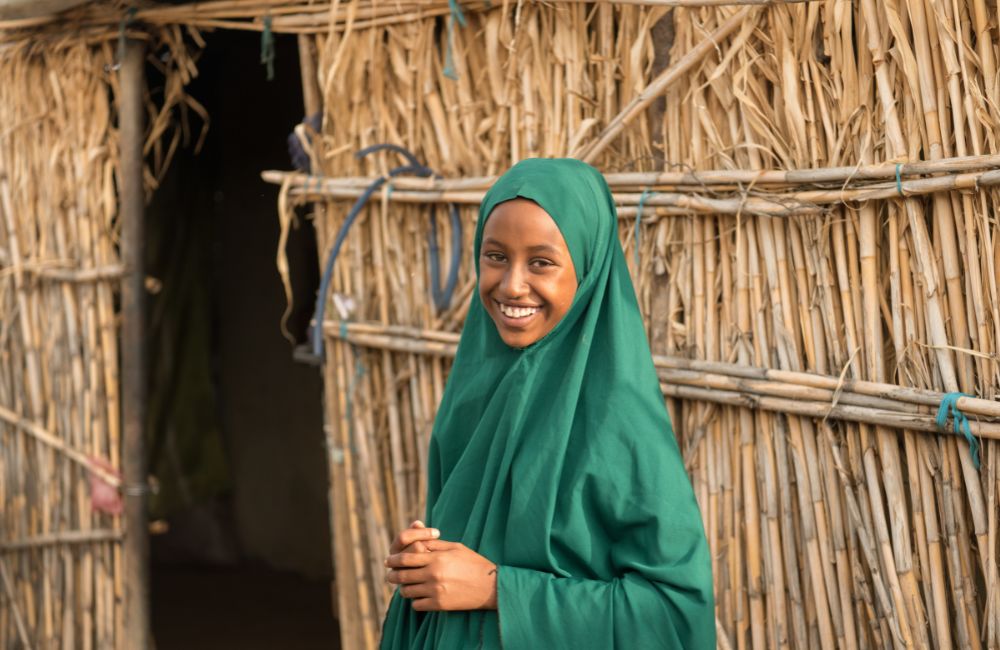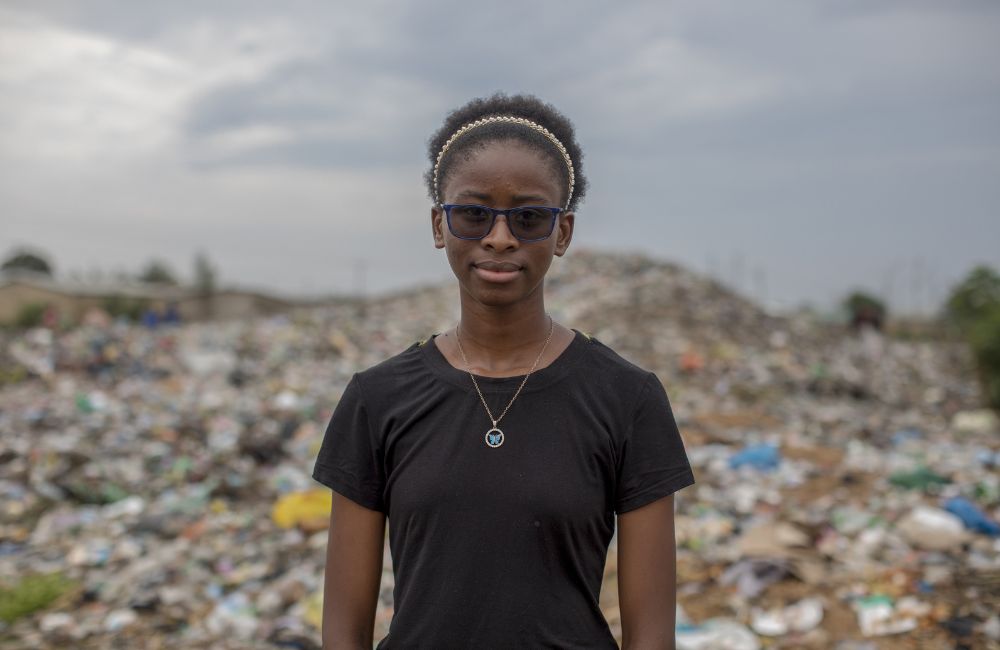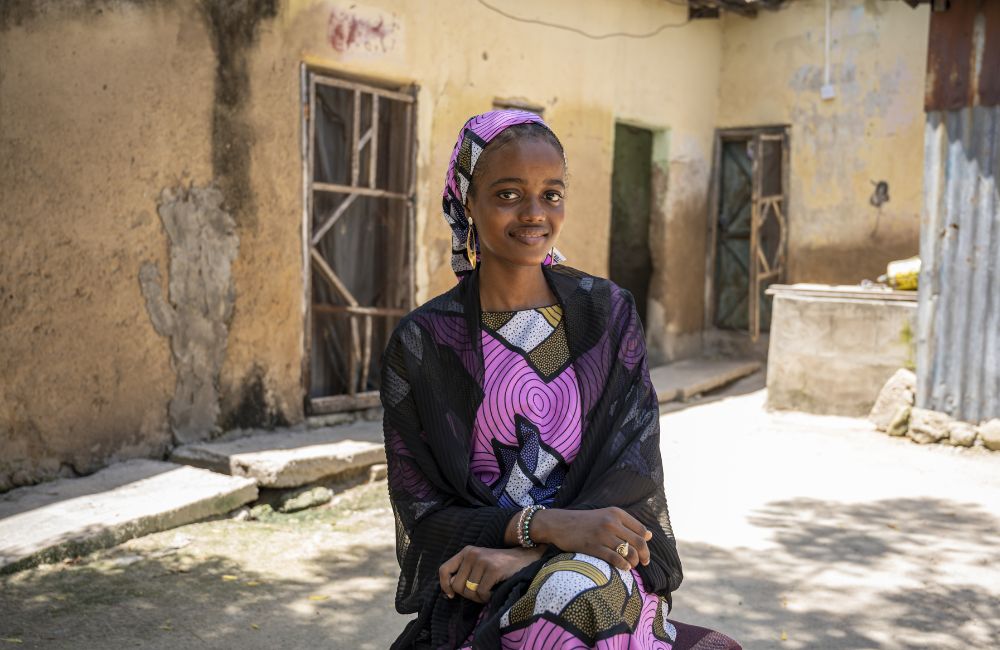“My message to girls getting married early is to remember that it has no advantage for you. It is better to focus on your education and your own life,” Fardowsa*
Fardowsa knows firsthand the impacts climate change can make on children’s lives, especially for girls.
The 12-year-old lives in Ethiopia where drought and food shortages are placing girls at increased risk of child marriage. In dire situations caused by the climate crisis, conflict and the increasing pressures of the cost of living, it is often girls that will bear the brunt of these situations. Increased rates of gender-based violence, child marriage and girls being forced to drop out of school to support the family are just some of the ways girls’ lives are specifically impacted.
For Fardowsa staying in education is vitally important. At such a young age she is acutely aware that education is the key to keeping girls out of danger and on track to a better life.
Around the world the effects of climate change are being felt. More frequent climate disasters such as floods, cyclones, wildfires and heatwaves are pushing families into poverty, driving them to leave their homes and creating harmful coping strategies, such as forcing children into child labour and child marriage.
Girls are at highest risk
Girls are at the highest risk during these times of crisis facing risk of sexual harassment and abuse where overcrowding is caused in the aftermath. In parts of Ethiopia worst hit by drought and food shortages, rates of child marriage rose by 119% in 2022 compared to 2021 and a 2020 study found that in Bangladesh, girls aged 11–14 were shown to be twice as likely to marry in years following extreme heat. In Zimbabwe, there have been recent reports of girls initiating their own marriages in the hope of increasing their access to food. These countries have some of the youngest and fastest growing populations in the world and with the increase in extreme climate events child marriage is set to increase.
Even with the odds stacked against them, all hope is not lost. Around the world girls and young women are taking on the increasing challenges facing their lives and their futures and creating change in their communities that will benefit themselves and the girls who come after them. Meet some of these incredible young people below.
Education is the key: Fardowsa, 12, Ethiopia

Fardowsa,* age 12 (Ethiopia).
Photo: Maheder Haileselassie Tadese / Save the Children UK.
12-year-old Fardowsa is in seventh grade at a primary school supported by Save the Children. The young activist is working within her community in Ethiopia to end child marriage and other harmful practices facing girls.
Multiple years of drought have meant that water sources have dried up and crops and livestock are in short supply. With ongoing conflict locally and abroad pushing the food prices up, many families are struggling to support themselves.
Since 2019, there have been five failed rainy seasons across the Horn of Africa leaving up to 20 million people in Ethiopia experiencing food insecurity. These increasing droughts and lack of food security force many families into making difficult choices about the fate of their daughters. But for Fardowsa she is fighting to convince people in her community that education, and not early marriage is the key to improving the lives of those around her.
“My message to girls getting married early is to remember that it has no advantage for you. It is better to focus on your education and your own life,” says Fardowsa.
Raising environmental awareness: Justina, 16, Zambia

16-year-old Justina, a child climate activist, poses for the camera at the dumpsite in her community in Zambia.
Photo: Cynthia R Matonhodze / Save the Children.
Justina lives with her family in Lusaka, Zambia. She has witnessed the weather patterns changing in her community and this has inspired her to become a climate activist. Her community has been experiencing extreme heat through the summer months. The heat has been so intense that students at school have experienced fainting and have had to miss school. Refrigerators are too expensive for most to afford, so the increasing heat also means that food spoils faster which has caused community members to become sick.
When the rains do come, they cause flooding in the region which further impedes children getting to school as they have to travel through dirty water. The water is so contaminated that this can also cause the children to become ill.
Justina is raising environmental awareness, helping to educate her community about planting trees, and taking public transport. Save the Children has helped her via a partner organization called Caritas Zambia. The group is implementing programs which focus on child protection and climate change.
“Us children are the ones mostly impacted by climate change or affected [by it]. So, we’re the ones having the wound, we’re the ones feeling it,” says Justina*
Fighting child marriage: Zaynab,* 16, Nigeria

Zaynab,* 16, sits for a portrait in her compound in Borno, Nigeria.
Photo: Etinosa Yvonne / Save the Children.
Zaynab is a champion for girls’ rights, speaking up about the issues facing girls in her region of Northeast Nigeria. The 16-year-old knows full well the impacts child marriage can make on young lives. She is personally motivated by the death of her friend who died in childbirth after being forced into marriage by her parents. Zaynab is also passionate about access to education, she was deeply affected when she had to miss a year of school due to conflict in the area.
Zaynab believes that during those periods of increased tensions in Borno, child marriage rates increased as parents used the opportunity to take their daughters out of school and marry them off.
“Child marriage denies a girl of a childhood, it disrupts her education, and it limits her opportunities as a human being,” says Zaynab.
While issues like the impacts of the climate crisis and increasing conflicts globally are affecting everyone, it is girls who will often suffer the most severe consequences in their lives. In October, we celebrated the International Day of the Girl. This day was separated from Day of the Child as it is important to recognize that there are very specific issues such as child marriage that impact, and tragically, often destroy the lives of girls. But with powerful voices like those of Zaynab, Justina and Fardowsa the future for girls is looking ever so slightly brighter.